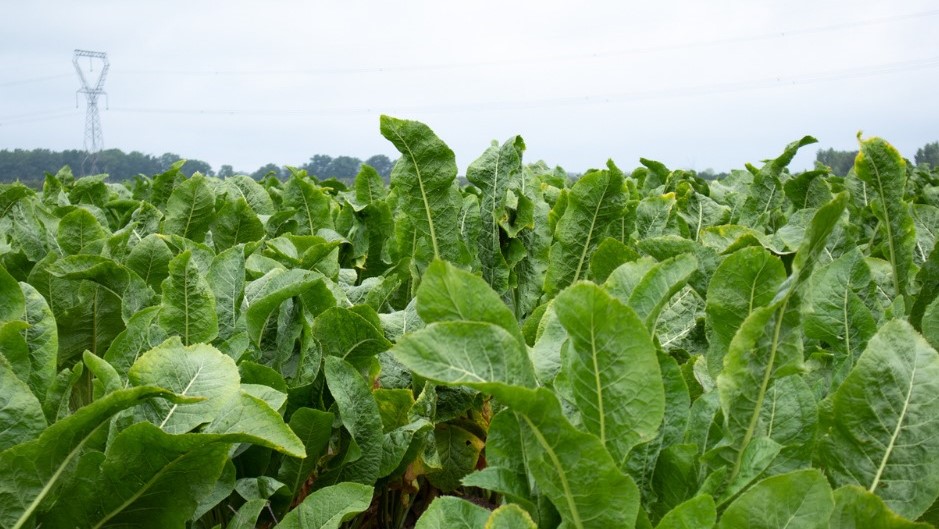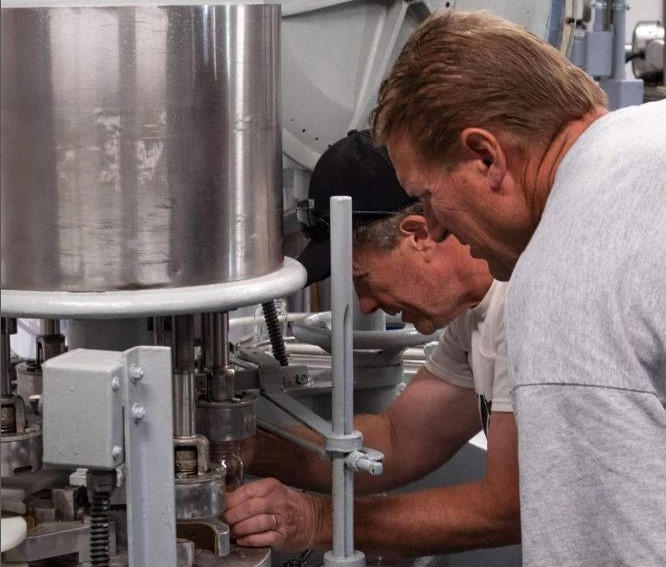Not many senior partners at Deloitte would describe themselves as “wannabe farmers.”
In fact, growing up in a city and holding a high-level corporate job for 33 years doesn’t easily conjure up the picture of the same man in coveralls and rubber boots standing in a field of horseradish. But when the time came to retire from Deloitte, Mark Whitmore, MBA '91, gladly ditched the suit and tie for a more rural uniform.
Running Deloitte Private meant Whitmore worked closely with entrepreneurs and private businesses of all types to help them thrive. At the back of his mind, Whitmore always knew he wanted to operate his own business but had enough self-knowledge to know his tolerance for risk wasn’t on the extreme end of the spectrum.
When he had the opportunity to take an early retirement from the corporate world, he knew he was ready for his next adventure. Investing some money in his own business at this stage of his life, fit nicely within his personal risk profile.
He began shopping around for a business to buy in the food/agricultural space. He wanted to have a tangible product to take to market. Nothing he saw appealed to him.
The Whitmore family did own a farm and he had been a part-time farmer for years - more or less breaking even most years. Whitmore decided to expand on the existing farm. The Great Canadian Hops Company was the result.
“Why not?” he thought.
Craft beer was making a huge comeback, people love it, the brewers are great people and locally grown hops sound appealing – what is the downside?
It turned out there is a big downside. The hops industry is a tough business. Local craft breweries demand consistent quality in their raw material. The brewers know they can get consistency from purchasing imported hops – and not always from locally grown hops - whose quality can vary greatly from year to year.
It was a beautiful idea and a terrible business.
His next farming venture was hazelnuts. Whitmore calls it, “another sort of science experiment.”
Turkey is traditionally the world’s largest supplier of hazelnuts, growing over 70% of the world’s supply. Farmland is limited and the Turkish farmers are switching their crops to olives. The biggest buyer of hazelnuts - Ferrero Rocher - decided to hedge their bets by offering incentives to farmers in Canada, Chile, South Africa, and Australia to grow the crop.
Whitmore thought it sounded promising and took a chance. He bought the trees, sprayed, pruned as required, and over five or six years produced precisely two hazelnuts.
Hardly enough to fill even one tray of Ferrero Rocher chocolates!
Whitmore says he still has the trees and occasionally goes out to see how they are doing. But as an enterprise, the idea is on hold.
A well-known part of entrepreneurship lore is to fail fast and move on. At this point, Whitmore admits he was just failing.
The next opportunity came along when Whitmore teamed up with an old colleague, Mark Healy, MBA '05. Both were Ivey graduates and friends of long standing. They had always casually thought it would be nice to do something business-wise together. They started looking around to see what might be out there.
In 2020, through a family connection, they came across a small commercial agricultural business that was for sale - Dennis’ Horseradish in Norfolk County.

The business was a 60-year-old enterprise that harvested, produced, bottled, and distributed top-quality horseradish in multiple flavours. The farm location in Delhi, Ontario, known as the heart of Ontario’s garden - guaranteed the horseradish was top quality with a fiery heat that connoisseurs love.
Dennis’ Horseradish ticked a lot of boxes for them. It was small – a manageable risk -, it was a tangible agricultural product, and it needed detailed time and attention to properly thrive. Then a third Mark asked to join the team. Mark Vandenbosch, HBA '84, was retiring from a distinguished academic career at Ivey. Vandenbosch brought in expertise in the area of finance and procurement.
The “three Mark” team bought a few other small complimentary investments to mitigate their overall risk - but the horseradish company was the main focus.
The key to a good working partnership, according to Whitmore, is to make sure right from the start your partners have similar groundings in terms of values and risk tolerance, and acknowledge each one brings something different to the mix. The three Mark team works on each level.
The business runs with a division of roles: Vandenbosch is procurement and finance, Healy’s expertise is marketing, domestic sales, and brand identity, and Whitmore is responsible for the operations side, which includes production and shipping. All three are willing to roll up their sleeves and pitch in, and are flexible to change when the business calls for it.
Whitmore notes the hands-on, manufacturing side of the business has been the steepest learning curve for all of them; since all had careers rooted in professional/managerial services.
"Getting a product like horseradish, in its jar, labeled, boxed, and out of the door is about as real as it gets," said Whitmore.

The Covid pandemic really brought this message home. Shortages of jars, labels, and ingredients were rampant.
"The pandemic seems to have left a permanent scar on manufacturing – just in time is dead. No one will ever trust they can get product again – not for a long time," said Whitmore.
Despite the obstacles, Whitmore loves the horseradish business. It’s manageable, there aren’t 1000 partners to work with, just the three key players who are totally invested in its success.
The business lets Whitmore hire people, create jobs, and export products – all things Canada needs. Whitmore is a strong proponent of private enterprise as the core of a healthy Canadian economy.
We need people to make stuff and export stuff, so we can create jobs and pay taxes to fund our Canadian lifestyle... We need more nurses, teachers in the schools – that stuff is expensive – somebody has to pay for that.
Currently, the business employs 14 people. Whitmore has had great success hiring people who have retired from their main careers but still want to be in the workforce. He notes they are a great group of employees; reliable, willing, and appreciating a good work-life balance with time off when they want it.
Whitmore believes anyone can be an entrepreneur if they put their mind to it and do their homework.
You need to ask yourself two questions – are you willing to take some risk and are you willing to work?
He adds a lot of people think being an entrepreneur means you have to invent the next iPad or the next Google. But being an entrepreneur can be as simple as buying a lawn maintenance company and running that – maybe adding a few new services of your own.
It doesn’t have to be high-tech – it can be very basic. Above all, it needs to fit your personal risk profile. He adds, sometimes expanding into more than one portfolio is a good strategy – so if one doesn’t work out maybe the next two will. You can manage your expectations and manage your losses that way. From experience he knows you don’t need to keep pouring money into all of them – you can let one or two ride.
Whitmore credits a former mentor of his from Deloitte, John Southcott, with giving him the best piece of business advice – always be in the market. Don’t just sit in an office and wait for your product to be perfect. Go out, try and sell it, talk to customers, and see what they think.
It’s wrong to say, I know what the market wants and I will build it and they are going to buy it. It doesn’t happen that way - you have to go out and test in the marketplace.
The current plan is to expand the export side of the horseradish business to the US. It’s a tough sell and an expensive proposition getting in front of US buyers, but it’s one that can pay off in a big way.
Whitmore concludes by sharing three important factors for a budding entrepreneur - pick your partners well, be persistent, and be prepared to change strategy along the way. He adds not everyone builds a Google or Facebook that skyrockets right away – you need time to see where it goes.
Whitmore is glad to have taken the chance to be a business owner and operator. He hopes his children will see first-hand the value in individuals working for themselves and creating wealth at the grassroots level.
It’s not always about building a Google or Facebook that takes off right away. For most entrepreneurs, it takes time to see where things are going.
Time for things to ferment and taste just right.


